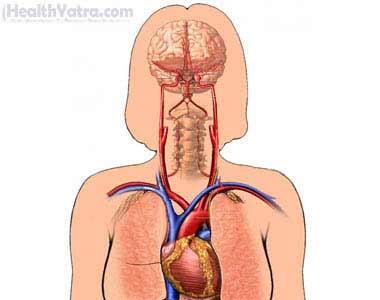Definition
Fainting is a loss of consciousness that happens quickly and sometimes without warning. A fainting episode usually resolves within seconds to minutes. If fainting is caused by another condition, then the condition will need to be treated.
Causes
In general, fainting is caused by decreased blood flow to the brain.

Decreased blood flow to the brain can be caused by:
Most commonly, vasovagal spells. Vasovagal spells can occur:
- During medical procedures
- During times of high stress, trauma, or fright
- After standing still for a long period of time
Medical conditions:
- Orthostatic hypotension, low blood pressure when standing
- Dehydration
- Anemia
- Hypoglycemia, which is low blood sugar
- Seizure
- Stroke or transient ischemic attack
- Abnormal heart rhythms
- Heart conditions
- Blood loss
Fainting can also occur as a side effect to medications. These include:
- Blood pressure medications
- Medications to regulate heart rhythms
- Diuretics
- Certain antidepressants
Risk Factors
Factors that increase your risk of fainting include having a history of fainting.
Symptoms
Symptoms may include:
- Sudden loss of consciousness
- Inability to remain standing or sitting
- Consciousness regained without any need for intervention
- Dizziness or lightheadedness before losing consciousness
When Should I Call My Doctor?
Call your doctor if you are having episodes of fainting. This is especially important if you:
- Have a heart condition
- Have a job where you or others may be at risk if you faint. Examples include airline pilot, bus driver,or machinist.
When Should I Call for Medical Help Immediately?
Call for medical help or go to the emergency room right away if you have:
- Weakness or numbness of face, arm, or leg, especially on the left side of the body
- Confusion
- Loss of balance, coordination problems
- Vision problems
- Severe headache
- Rapid, irregular heartbeat; chest pain
Diagnosis
Your doctor will ask about your symptoms and medical history. A physical exam will be done.
Tests may include:
- Blood tests
- Electrocardiogram (EKG)
- Holter monitoring
- CT scan
- Electroencephalogram (EEG)
- MRI
- Echocardiogram
- Tilt table testing
- MR angiogram and CT angiogram
Treatment
Treatment will depend on the underlying condition that has caused fainting. This may include medications, lifestyle changes, or surgery.
If you are diagnosed as having fainted, follow your doctor’s instructions.
Prevention
If you are prone to fainting:
- Know the warning signs. If you feel that you are going to faint, sit or lie down right away.
- Get up slowly and carefully from lying down. Start by sitting up for a minute and then stand up.
- Drink plenty of fluids.
- Discuss dietary changes with your doctor.
- Avoid using alcohol or other drugs.
There are certain physical maneuvers that rapidly raise blood pressure and blood flow to the brain. They are called physical counterpressure maneuvers. When these are done during warning signs, you may be able to prevent fainting. Examples include:
- Crossing your legs while tensing the muscles of legs, abdomen, and buttocks.
- Forcefully squeezing a rubber ball or other object as hard as possible. Try to use your dominant hand.
- Gripping one hand with the other while tensing both arms and raising the elbows slightly.
